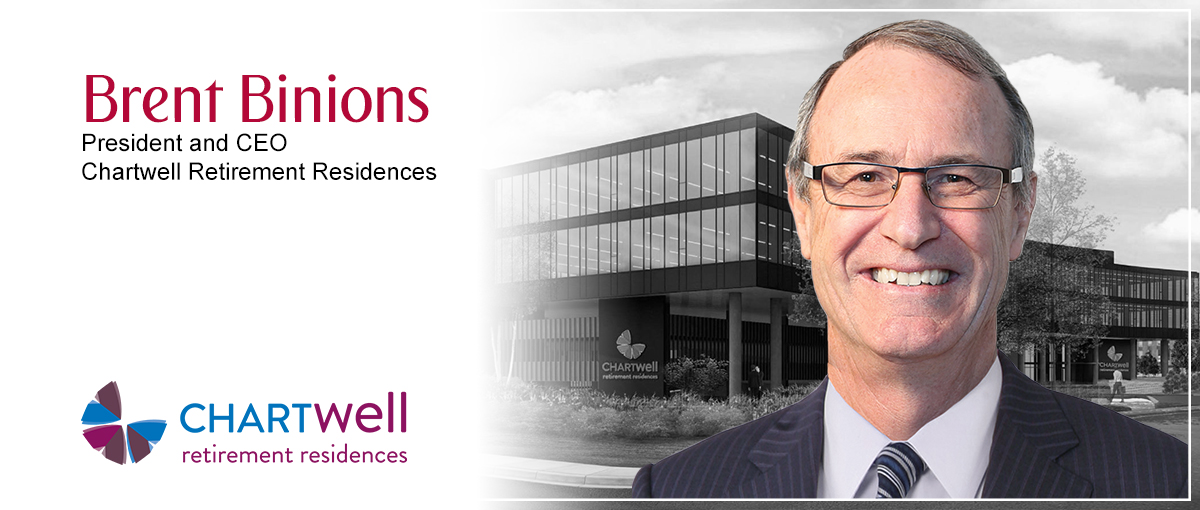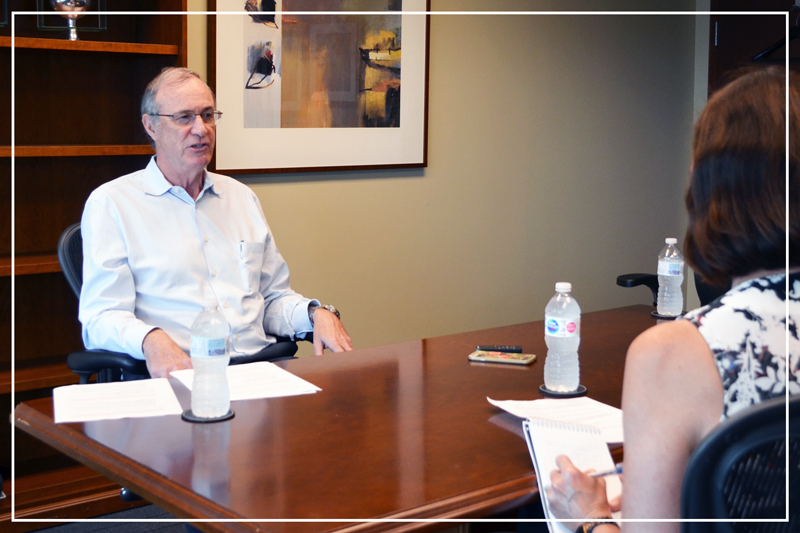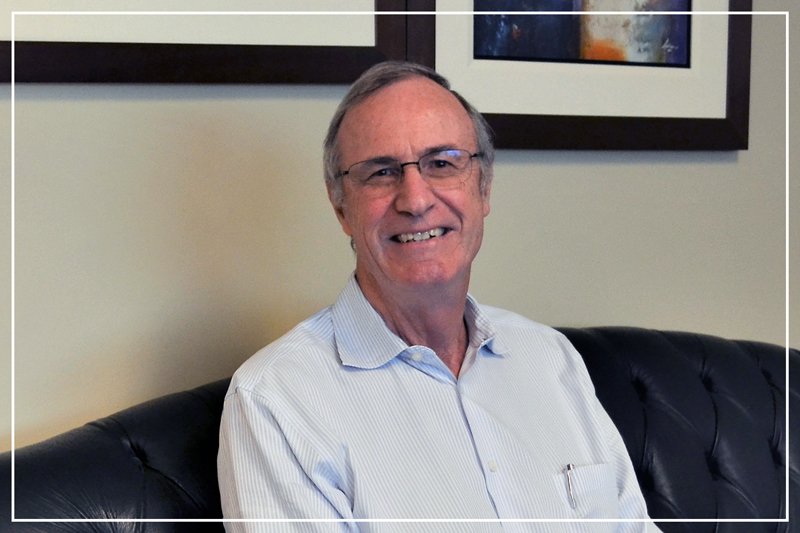Sponsored by



Meet Brent Binions, President and CEO of Chartwell Retirement Residences, who got his start in the senior housing sector as a young man working in the family business. After more than 35 years in the sector, he was appointed President and CEO of Chartwell in 2009 and under his leadership, it has become the largest seniors’ housing company in Canada with more than 200 retirement and long term care communities in four provinces.
Binions is a past President of the Ontario Long Term Care Association and a past Vice President of the Ontario Residential Care Association. He also holds an LLB from Osgoode Hall Law School in Toronto. We sat down with Binions to chat about what it takes to be a strong leader, how a happy, motivated staff is good for the bottom line and why giving back is so important to him.
Conversation with Brent Binions
Note: This interview transcript has been edited for length.
ORCA: I understand you started in the senior living sector as a teen, working as everything from a gardener to a dishwasher in the family business — what impact did those early experiences have on you?
BRENT BINIONS:
Yes, my dad ran seniors’ housing and from the time I was 16 through to when I graduated from law school, I kind of filled in for people when they went on summer vacation. If the janitor was away, I was the janitor; if the housekeeper was away, I did the laundry. I learned how important every single job is to the business running well, and that every job mattered tremendously to the quality of life we were delivering to our residents. I realized then that, if we did our job right, we had an opportunity to make a difference in people’s lives every day — and that’s what I’ve taken with me throughout my career.
ORCA: When did you decide to make working in retirement living more than just a summer job?
BRENT BINIONS:
When I was in law school if anyone asked me what I planned on doing, I’d say I was going to leave law eventually to go into the business world because I think it’s much more interesting than law. After graduating, I practiced law for three years. By then my dad had grown the business to 10 retirement properties and long-term care homes and his existing partnership was coming to an end. He told me, “This is the window if you want to come back and run the business,” so that’s what I did.
ORCA: What was the learning curve like?
BRENT BINIONS:
It was exciting and one of the best times of my life in terms of the experience I got and what I learned. I did the banking and set up processes to manage the operations and I also did all of our collective bargaining and labour negotiations. That was a tremendous experience because you actually get to meet with the frontline people and understand what that their issues are, and you get a way better understanding of the operating side — it’s a terrific way to learn more about the business.
ORCA: What’s changed most since the days when you first started out?
BRENT BINIONS:
One of the biggest changes has been the professionalism of people in the senior living sector. It was once seen as a mom-and-pop industry and not as a path to a career. But today, it’s a pretty sophisticated business with a lot of people coming in who start at one level and move up, something like what I did — I started working at the bottom and now I’m the CEO.
ORCA: You seem very passionate about your choice of career — what keeps you excited both about the sector in general and your role as a leader within it?
BRENT BINIONS:
There is no business I know of where you can directly impact the lives of so many people on a daily basis. We have 28,000 residents and 15,000 staff members and their lives are directly affected by how well we do our job. You can go home from this business and, if you’re doing your job well, you can have a tremendous amount of satisfaction.
ORCA: Wow, 15,000 staff members — how do you keep such a big team happy and motivated?
BRENT BINIONS:
We recognize our top-performing home every year, measured by three criteria: customer satisfaction, employee engagement scores, and budget. The most important thing is employee engagement. (We believe highly engaged employees deliver better customer service and that’s actually what helps a home meet its budget.) For the top home in Canada, I take my entire senior team to thank the staff personally, then spend a couple of hours meeting with residents themselves.
ORCA: You must hear some great stories when you get out to chat to staff and residents.
BRENT BINIONS:
Yes, that’s what I miss most in my role now as I don’t get to do it as much as I did in the early days. We were recently visiting a home that scored 97 percent “very satisfied” (which is an extraordinary score) and I asked the residents to tell me why they rated the home so highly. One guy stood up and said, “Well, I’ve been here for five years and they’ve been the best five years of my life — if I’d had any idea how good my life was going to be, I would have come five years earlier.” We don’t make widgets, we actually touch people every day. And that’s what drives me.

ORCA: It must take some pretty strong leadership to achieve that level of both customer and staff satisfaction. What are the most important qualities of a good leader?
BRENT BINIONS:
I think the first thing is vision. A leader has to have vision for where the company is going, as well as absolute clarity for what your expectations are, because people can’t go anywhere if they don’t know what you’re asking them to do. A great leader is also a topnotch communicator who explains it to people, so they understand it. And finally, to be a great leader people have to see that you have a passion for what you’re doing — and you can’t be afraid to surround yourself with highly talented people. Great leaders aren’t worried that one of those people might take their job one day because the success of a company depends on the quality of the people a leader surrounds themselves with.
ORCA: Who was the most influential leader in your career?
BRENT BINIONS:
I learned all of this from my father, Murray. He was a great leader and he was my mentor. My dad was a self-made man; he didn’t finish high school, but he always had a vision for what he was going to try to do. And people loved to listen to him talk about what could be done — he was clear in what wanted to accomplish, he was innovative, he was aggressive in terms of trying to look for different ways to do things and he attracted good people around him. He was also open to any question and was respectful of curiosity and inquisitiveness.
ORCA: Your dad sounds like a remarkable man.
BRENT BINIONS:
He was. And one of the things I liked most about him (he passed away fairly young, when he was in his 60s) was that it didn’t matter who you were — you could be the CEO of another company or the person cleaning the bedrooms in one of the residences — he treated everybody exactly the same, and all with respect. “Status” was completely irrelevant to him, and I’ve tried to adopt that as I went along.
ORCA: How else has your father had an influence on your style of leadership?
BRENT BINIONS:
When asked, ‘How do you make a decision?” my Dad would always answer, “Well, you just do what’s right.” And so, when people ask me that question today, I’ll say, “Well, what’s right?” And I combine that with, “What’s the vision of the company? Filter every decision you make through our vision, which is to make people’s lives better.”
ORCA: Considering the impact your father had on you as a mentor and a role model, how important has being a mentor yourself been to you throughout your career?
BRENT BINIONS:
It’s been very important to me. And what I’ve learned about mentoring is that it’s almost as valuable to me as it is to the mentee, because the mentee is coming in with a different set of eyes. You’ll say, “Here’s what we do” and they’ll say, “Why do you do it that way?’” That’s a good question. Why do we do it that way? And sometimes I can answer the question, and sometimes I think, “Well, I don’t know, maybe there’s a better way, let’s chat about that.” Anytime you engage in a discussion on an issue, the outcome is better.
ORCA: Looking back at your career, what are you most proud of?
BRENT BINIONS:
Well, on the retirement home side, when I took over this company in 2009, it was pretty broken. It wasn’t doing very well financially, but over the last 10 years, it has become the largest seniors’ housing operator in Canada, with outstanding operations, a focus on service excellence and a very strong balance sheet — I’m quite proud of that. And I’m also proud of how we’ve given back to our community.
ORCA: Why is giving back important to you?
BRENT BINIONS:
I’ve always looked for the best way to give back and, over the years, we aligned ourselves with numerous charities, addressing everything from diabetes and osteoporosis to cancer and Alzheimer’s — all of which are terrific causes. But I kept looking at my team and saying, “Let’s find something that makes a difference in the lives of seniors right now.” We eventually found a charity in the United States called Wish of a Lifetime that was granting wishes to seniors and set up a deal to partner with them in Canada, but it took two years to get it through Revenue Canada because they felt that seniors shouldn’t be granted charitable status (you can imagine how ticked off I was).
Finally, we got approval — and now Wish of a Lifetime Canada has granted 100 wishes to seniors across the country. The stories that have come out that…well, they make you cry. Like the story of a guy who ended up getting flown to Thailand to see his great-grandchildren for the first, and probably the only, time in his life. The stories are fantastic and show just how big a difference we can make in the lives of seniors.
ORCA: You’ve built quite a legacy over the course of your career. Now that you’ve announced your retirement, what does the future hold for you?
BRENT BINIONS:
Well, I plan to do some traveling because there are a lot of places I want to go. I’m a huge fan of history, so Jerusalem and Petra, Jordan, are on the top of my list. But, I’m still CEO here for another eight months, so that’s my focus — I’ve got some things I still want to do. I’m also going to remain on the board of directors at Chartwell, which means I’ll stay connected with this company that I love and still have some ability to provide input and hopefully contribute to its successes in the future. Best of all, I get to stay connected with all the great people here— because that is, without question, what I’ll miss the most.

Dynamic. Smart. Energetic. Committed.
Leaders in Ontario’s retirement communities sector are changing the way the world thinks about senior living.
Join ORCA as we speak to the premier leaders in the sector today – about who they are, why they are here and where we are going.
Sponsored by:
